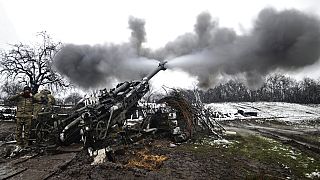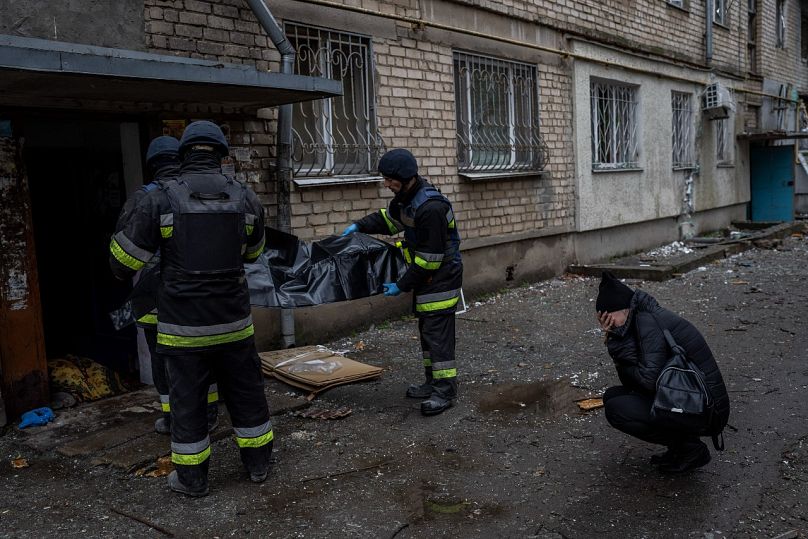Ukraine war: Snowy Kyiv battles power cuts, Russia ‘may leave’ Zaporizhzhia, Kherson exodus
1. Half of Ukraine’s regions grapple with power blackouts as snow blankets Kyiv
Snow fell in Kyiv and temperatures hovered around freezing on Sunday as millions in and around the Ukrainian capital struggled with disruptions to electricity supply and central heating caused by waves of Russian air strikes.
Repair crews across the country have been scrambling to restore heat, electricity and water services that were blasted into disrepair.
Ukrenergo, the state power grid operator, said on Sunday that electricity producers are now supplying about 80% of demand — an increase of 5% on Saturday. The capacity deficit stood at 20%, it added.
But it also said that electricity producers are still unable to resume full power supply and have no choice but conserve energy by imposing blackouts.
A senior official from YASNO, which provides energy to Kyiv, has said the situation in the city has improved but still remained “quite difficult”, adding that residents should have at least four hours of power per day.
Moscow has targeted vital infrastructure with air strikes that have sparked widespread power outages and killed civilians. Fresh strikes last Wednesday caused the worst damage so far in the nine-month conflict.
Millions of Ukrainians have been left with no light, water or heat even as temperatures fell below zero degrees Celsius.
David Arakhamiya, the head of President Volodymyr Zelenskyy’s party, predicted Russia would carry out new infrastructure attacks said the coming week could be “really difficult”.
Zelenskyy said on Saturday evening that there were restrictions on the use of electricity in 14 out of Ukraine’s 27 regions, including Kyiv and the surrounding area. He warned that increased consumption would bring more outages.
Weather forecasters expected continued snowfall in Kyiv, a city that had 2.8 million residents before the war, until midweek while temperatures are forecast to stay below freezing.
2. Signs Russia may leave Zaporizhzhia plant, says Ukraine’s nuclear chief
The head of Ukraine’s state-run nuclear energy firm said on Sunday there were signs that Russian forces might be preparing to leave the vast Zaporizhzhia nuclear power plant which they seized in March soon after their invasion.
Such a move would be a major battlefield change in the partially-occupied southeastern Zaporizhzhia region where the front line has hardly shifted for months. Repeated shelling around the plant has spurred fears of a nuclear catastrophe.
“In recent weeks we are effectively receiving information that signs have appeared that they are possibly preparing to leave the (plant),” Petro Kotin, head of Energoatom, said on national television.
“Firstly, there are a very large number of reports in Russian media that it would be worth vacating the (plant) and maybe worth handing control (of it) to the (International Atomic Energy Agency – IAEA),” he said, referring to the United Nations nuclear watchdog. “One gets the impression they’re packing their bags and stealing everything they can.”
Russia and Ukraine, which was the site of the world’s worst nuclear accident in Chornobyl in 1986, have for months repeatedly accused each other of shelling the Zaporizhzhia reactor complex, which is no longer generating energy.
Asked if it was too early to talk about Russian troops leaving the plant, Kotin said on television: “It’s too early. We don’t see this now, but they are preparing (to leave).”
The head of the UN nuclear watchdog, the IAEA, met a Russian delegation in Istanbul on Nov. 23 to discuss setting up a protection zone around Europe’s largest plant to prevent a nuclear disaster. Russian media reports have quoted a government minister as giving a positive response in principle.
On Friday, the IAEA said Ukraine’s three nuclear plants on government-held territory had been reconnected to the grid, two days after a Russian missile barrage forced them to shut for the first time in 40 years.
3. Residents flee Kherson amid constant Russian shelling on liberated city
Fleeing Russian shelling, civilians on Saturday streamed out of the southern Ukrainian city whose recapture they had celebrated just weeks earlier.
A line of trucks, vans and cars, some towing trailers or ferrying out pets and other belongings, stretched a kilometre or more on the outskirts of Kherson.
Days of intensive shelling by Russian forces prompted a bittersweet exodus. Many civilians were happy that their city had been won back, but lamented that they couldn’t stay.
“It is sad that we are leaving our home,” said Yevhen Yankov, as a van he was in inched forward. “Now we are free, but we have to leave, because there is shelling, and there are dead among the population.”
Poking her head out from the back, Svitlana Romanivna added: “We went through real hell. Our neighbourhood was burning, it was a nightmare. Everything was in flames.”
Ukraine in recent days has faced a blistering onslaught of Russian artillery fire and drone attacks, with the shelling especially intense in Kherson.
Often the barrage has largely targeted infrastructure, following Russia’s setbacks on the battlefield, although numerous civilian casualties have been reported.
At least 32 people in the southern Ukrainian region of Kherson have been killed by Russian shelling since pro-Moscow forces pulled out two weeks ago, the head of Ukraine’s police said on Saturday.
Galina Lugova, head of the city’s military administration, said in an interview on Sunday that evacuation trains had been lined up and bomb shelters set up in all city districts with stoves, beds, first aid kits and fire extinguishers.
“We are preparing for a winter in difficult conditions, but we will do everything to make people safe,” Lugova said. Her biggest worry, she said, was “shelling that intensifies every day. Shelling, shelling and shelling again.”
Emilie Fourrey, emergency project coordinator for aid group Doctors Without Borders in Ukraine, said an evacuation of 400 patients of Kherson’s psychiatric hospital, which is situated near both an electrical plant and the frontline, had begun on Thursday and was set to continue in the coming days.
4. Wintry warfare looms, military analysts predict
Analysts have predicted that wintry weather — bringing with it frozen terrain and grueling fighting conditions — could have an increasing impact on the direction of the conflict that has raged since Russian forces invaded Ukraine more than nine months ago.
But for the moment, both sides were bogged down by heavy rain and muddy battlefield conditions in some areas, experts said.
The Institute for the Study of War, a think tank that has been closely monitoring developments in Ukraine, said reporting from both sides indicated that heavy rain and mud have had an impact — but wider freezing expected along the front lines in coming days could play a role.
“It is unclear if either side is actively planning or preparing to resume major offensive or counter-offensive operations at that time, but the meteorological factors that have been hindering such operations will begin lifting,” it said in a note published on Saturday.
ISW said Russian forces were digging in further east of the city of Kherson, from which they were expelled by Ukrainian forces more than two weeks ago, and continued “routine artillery fire” across the Dnipro River.
In the eastern Donetsk region, five people were killed in shelling over the past day, according to governor Pavlo Kyrylenko. Overnight shelling was reported by regional leaders in the Zaporizhzhia and Dnipropetrovsk areas to the west.
Kharkiv governor Oleh Syniehubov said one person was killed and three wounded in the northeastern region.
5. €144 million raised under ‘Grain from Ukraine’ programme, Zelenskyy says
President Zelenskyy said some $150 million (€144 million) had been raised under the “Grain from Ukraine” programme following Saturday’s food security summit held in Kyiv.
Several European Union leaders were in the Ukrainian capital for an “International Summit on Food Security” to discuss food security and agricultural exports from the country, as well as the 90th anniversary of the Soviet-era famine known as the Holodomor.
.A deal brokered by the UN and Turkey has allowed for safe exports of Ukrainian grain in the Black Sea amid wartime disruptions that have affected traffic.
“The total amount we have raised for ‘Grain from Ukraine’ is already about $150 million. The work continues,” Zelenskyy said in his nightly TV address.
“We are preparing up to 60 ships. All of us together do not just send Ukrainian agricultural products to those countries that suffer the most from the food crisis. We reaffirm that hunger should never again be used as a weapon.”
Ukraine has accused the Kremlin of using the same “genocidal” tactics that it used against it in the 1930s under Josef Stalin.
 A large military gun is fired in Ukraine, November 2022. – Copyright Roman Chop
A large military gun is fired in Ukraine, November 2022. – Copyright Roman Chop
